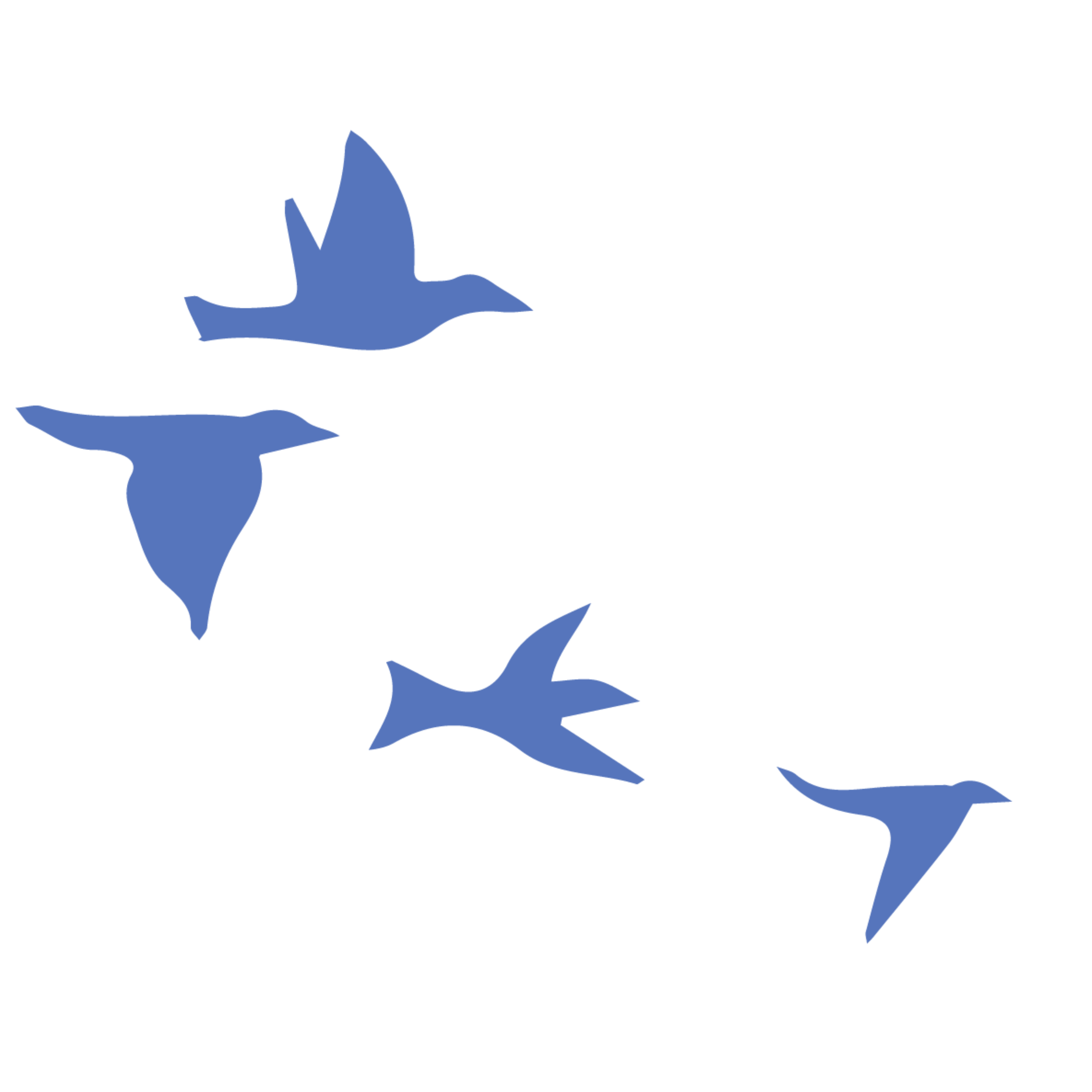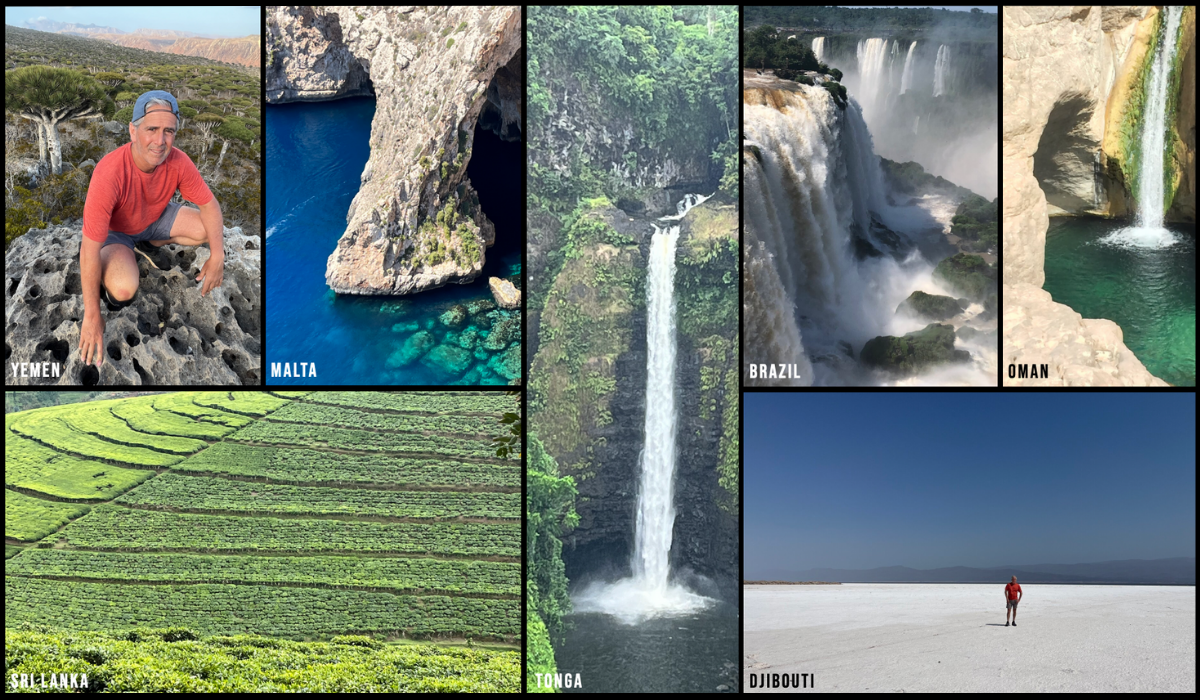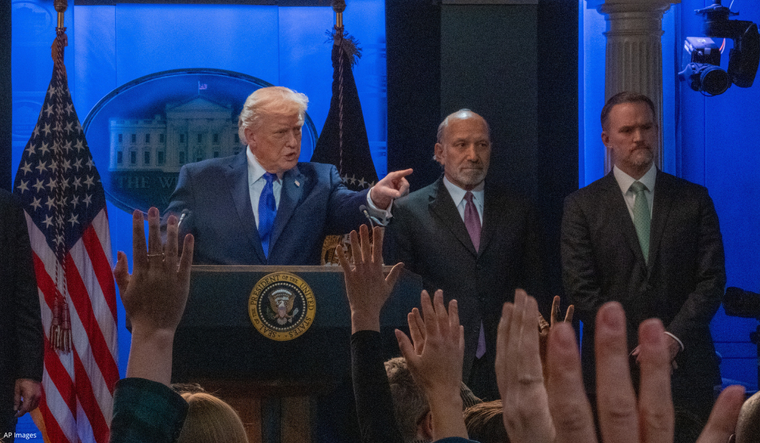“I Traveled to Every Country in the World in the Years After My Wife Died”

The phone rang in a Dubai hotel room and from then my life shattered, splitting into two: before and after.
It’s a fool’s game to believe we have control over our lives. In late 2017, on the eve of our empty-nesting years, I was in an airport hotel in Dubai, awaiting a morning flight to Nairobi to reunite with my wife. Then, a phone call came that landed like a detonation: my wife had died in a tragic accident in Botswana.
What followed was the darkest chapter of my life.
Telling my sons they had lost their mother was like living a nightmare in real time, one that never fades. Then came the calls to my wife’s family, my own, and our closest friends, each conversation a fresh wound.
And when the telling was done, when the logistics of tragedy had been faced, we were left in the silence. Reeling from heartbreak, we had to confront the unimaginable: the center of our family was gone. Just like that.
It was a time of deep sorrow, a season of grieving that led me to give up everything I had been doing and turn inward. I leaned into the grief. Reading Meditations by Marcus Aurelius, I was struck by a passage: “You have power over your mind, not outside events. Realize this, and you will find strength.” Through meditation, and the enduring wisdom of the Stoics, I began to believe it.
In time, once I felt steady enough to stand, I felt grateful to have the choice to return to something that had always grounded me: travel.
I had lived and worked in seven countries across four continents and had even taken two years off to travel with Jackie through Asia and Africa before we had children. Travel was who I was and, somehow, I knew I had to return to those roots even if I knew I was doing it to escape. I simply couldn’t return to an empty house full of echoes and memories.
That first trip, to run the inaugural Dushanbe International Half-Marathon in Tajikistan, was more than just a race, it was a threshold and marked a big turning point. I returned home no longer consumed by grief. Though I still thought about Jackie every day, the memories didn’t break me like they had earlier.
As more journeys followed, Uruguay, Paraguay, Turkmenistan, the Camino with my sons, Suriname, Guyana, something inside me began to reawaken. Slowly, unevenly. Healing is never a straight line.
But with each new country and unfamiliar landscape, I realized I wasn’t just running away anymore. Slowly moving forward, I found that I was traveling to heal. Yet even with glimpses of healing, I wasn’t sure where the path was leading, or how to fully reclaim my life. Then came a chance call with a young Spaniard, Álvaro Rojas, who had recently become one of the then estimated 250 people to travel to every country in the world. His story lit a spark in me, and I knew that was what I had to do.
As I stepped into that goal, I also discovered a small but passionate global community of like-minded wanderers, people equally committed to seeing the entire world. We were all seeking something: adventure, insight, connection, perhaps even escape. In them, I found a kind of home, not bound to any one place, but forged through shared purpose and a deep, unspoken understanding about the need to feel alive. Travel does that. Again, it was Marcus Aurelius in my ear, “It is not death that a man should fear, but never beginning to live.”
“The journey taught me that healing doesn’t come from forgetting pain, it comes from honoring and leaning into it. From transforming loss into empathy, isolation into connection, and sorrow into meaning.”
Though my final country, No. 193, North Korea, still eludes me, I see my journey to every other nation in the world mostly complete. The number gave me direction, but the real beauty lay in what unfolded between the counting of countries.
Looking back now, three years after launching this quest, I realize I am not the same person who began it. And I feel good about that. I’ve vastly expanded my understanding of the world, challenged long-held narratives about people and places, and been continually awed by the natural wonders and diverse cultures that make up our planet.
Above all, I’ve discovered a deep passion for the stories of ordinary people. Each story, shaped over generations, contributes to the soul of what makes our world truly unique.
Travel also taught me humility, hope, and the power to transform previously held beliefs. Whether sharing coffee with two men in a war-torn region of Sudan or breaking bread with a Syrian refugee family in Lebanon’s Bekaa Valley, I witnessed kindness and dignity that endure even in the harshest of circumstances. These moments challenged the fear and division often amplified by headlines. They reminded me that true connection is possible across cultures and borders, and that belonging is rooted not in wealth or power, but in presence, empathy, and mutual respect.
Every country in the world holds its own unique beauty, but seeing so many in such a concentrated span of time created a mental expansiveness that’s hard to describe: over 4,000 peaks above 20,000 feet in Northern Pakistan; the endless, jaw-dropping camel and yak-dotted valleys of Western Mongolia; the austere sea ice stretching from Svalbard to the North Pole; the sweeping desert of Mauritania; and countless other natural wonders that etched themselves into my memory.
A big part of my journey was connecting with everyday people and learning about their lives and challenges. In the Kutupalong Refugee Camp in Bangladesh, I met a Rohingya father who had walked barefoot for ten days to bring his children to safety. He showed me the makeshift school they'd built from plastic sheets.
“We lost everything,” he said, “but not our hope.”
Through these encounters, I came to understand that the world is far more complex, and far more compassionate, than I had imagined. I saw how history, culture, and faith intertwine to form the rich tapestry of human experience.
This truth came alive at the world’s most spectacular festivals: in Chad, where the nomadic Wodaabe celebrate the seasonal rains with the Gerewol festival, a vibrant ritual in which women choose their partners from elaborately adorned male dancers; and in Papua New Guinea, where tribes from among the country’s estimated 800 gather at the Mt. Hagen festival to share their unique traditions through song and dance, a peaceful expression of pride and coexistence.
I often wondered what Jackie would have thought of all this, of the mountains, the rituals, the strangers who became friends. I think she would have reminded me to stay present, curious, and to keep listening.
Amid all these experiences, something deeply personal emerged: grief had cracked me open in a way that allowed me to see all of this more clearly. Where loss once made me want to retreat, I found myself instead reaching out….to strangers, to stories, and to a deeper sense of purpose.
This awakening reshaped how I see myself and my place in the world. I am no longer just a traveler passing through; I am a participant in a vast, interconnected human story. The journey taught me that healing doesn’t come from forgetting pain, it comes from honoring and leaning into it. From transforming loss into empathy, isolation into connection, and sorrow into meaning.
Back in that Dubai airport hotel, when the phone rang and my world fell apart, I believed life had ended. In many ways, it had. But loss didn’t break me, it opened me. And in that opening, the world poured in: in stories, in landscapes, in strangers who became teachers.
I set out trying to outrun grief. But during my journey to every country in the world, I found something much more expansive. I found connection and belonging. And with it, a new beginning.
Barry is the founder of Caravan to Class, a nonprofit advancing girls’ education in West Africa through the Bourse Jackie program, named in his wife’s honor. His book, Belonging to the World (Girl Friday Books), will be released in early 2026. To learn more, visit belongingtotheworld.com.
Please note that we may receive affiliate commissions from the sales of linked products.



